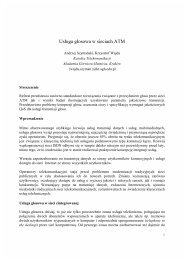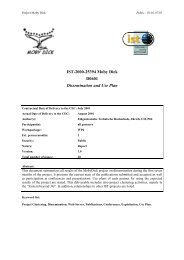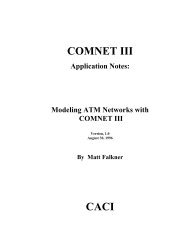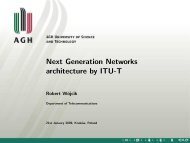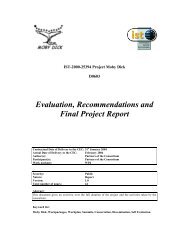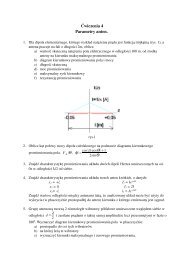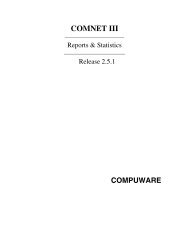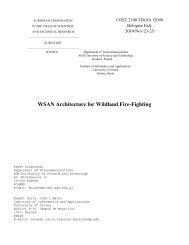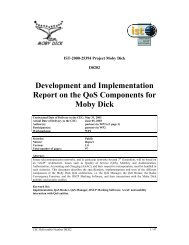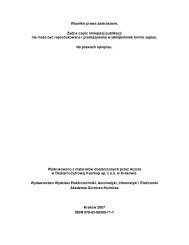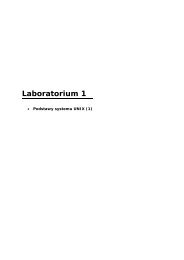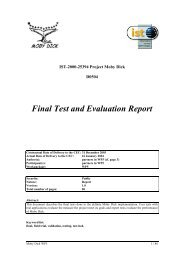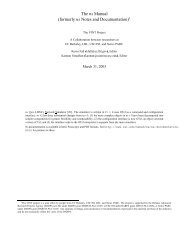Moby Dick Consolidated System Integration Plan
Moby Dick Consolidated System Integration Plan
Moby Dick Consolidated System Integration Plan
Create successful ePaper yourself
Turn your PDF publications into a flip-book with our unique Google optimized e-Paper software.
D0103v1.doc Version 1 6.7.2003<br />
In case of Fast Handover, it might be necessary to buffer IP packets from the new Access Router, during<br />
the bi-casting phase, before the new connection between the Mobile Terminal and the Radio Gateway is<br />
established. In fact, the problem happens only for a Fast Handover between two Radio Gateways, where<br />
there is a time interval during which the MT has closed its connection to the old RG and not opened yet<br />
the connection to the new RG (the MT can handle a connection to only one RG at the same time). From<br />
an implementation point of view, there is nothing simple we can do, as the RGs are not aware of a Fast<br />
Handover taking place. Therefore, we accept to loose a “certain” number of packets in this specific case.<br />
The Packet Transmission block receives IP packets from the IWF via a raw socket interface, using the<br />
message IWF_IP_PACKET. The associated local connection reference will be used to determine to which<br />
MT (radio connection in fact) it is associated.<br />
Then it will determine if it is an IP signalling packet or an IP data packet, by analysing its DSCP code<br />
(the IP signalling packets have a DSCP corresponding to a specific class).<br />
The IP signalling packets are transmitted directly to the Control Channel Management block of the RCF<br />
(with the local connection reference).<br />
The data packets are analysed to perform the mapping between IP QoS classes and radio bearers / radio<br />
QoS classes: based on the DSCP code of the IP packet, a radio bearer is selected, with a radio QoS class<br />
associated to it. The RCM manages a fixed number of radio bearers per MT, each one associated to one of<br />
the radio QoS class available. These radio bearers will be: 0—4 for signalling channels, 5—31 for data<br />
channels.<br />
At the RCM level, a table will be stored for each MT identified by its local connection reference with, for<br />
each valid DSCP code, the associated [bearer id, Radio QoS class, SAP id].<br />
If the radio bearer is not yet established, the QoS Broker “is about to” send the characteristics of this radio<br />
bearer to the IWF, which will forward the information to the RCF with message<br />
RADIO_ACCESS_ALLOCATION. In the meantime, the IP packets will be stored.<br />
When the message RADIO_ACCESS_ALLOCATION is received from the IWF, we update the RCM table<br />
and a request is made to the Data Channel Management block of the RCF to establish the radio bearer,<br />
with the local connection reference, the radio bearer Id, the radio QoS class, the DSCP code, as<br />
parameters.<br />
An answer is expected from the RCF, to give the status of this operation, upon which the radio bearer is<br />
declared established or not. The answer will contain the local connection reference, the DSCP code, the<br />
radio bearer Id and a SAP Id as parameters.<br />
If it is established, the IP data packets can be transmitted to the Data Channel Management block of the<br />
RCF (with the local connection reference, the radio bearer Id and SAP id), to be sent on the radio bearer<br />
by the AS.<br />
The RCM can also receive the message RADIO_ACCESS_ALLOCATION from the QoS Attendant of the<br />
IWF, when a request from a MT to open a radio bearer associated to this DSCP code has been sent to the<br />
QoS Broker. We will use the same process as for an incoming IP packet, which has been described before<br />
(mapping between DSCP / radio bearer + radio QoS class, update of RCF table, and request to the RCF to<br />
open the radio bearer).<br />
The RCM can also receive the message RADIO_ACCESS_ALLOCATION from the QoS Attendant of the<br />
IWF, in the Fast Handover case (a specific value of parameter status will identify this situation). In this<br />
case, we receive a list of the currently used DSCP codes, and their associated radio QoS classes. We will<br />
store this information in the RCM, and when the radio connection between the MT and RG is opened (as<br />
a part of the Fast Handover process), we will use these data to establish the radio bearers, at the same time<br />
we establish the radio connection.<br />
4.3.2.3 Packet Reception block<br />
The IP signalling packets and the IP data packets received from the RCF are transmitted to the IWF via a<br />
raw socket interface, using the message IWF_IP_PACKET.<br />
D0103v1.doc 82 / 168



